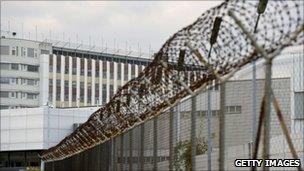Europe split over prisoner voting rights
- Published

Prisoners in Germany, for example, are all allowed to vote
The UK is considering giving prisoners the vote, five years after the European Court of Human Rights (ECHR) ruled its present ban was unlawful. How does Britain compare with the rest of Europe?
The ECHR was created in 1959 and provides a final court of appeal for those who feel their human rights have been infringed.
Any citizen of the 47 states signed up to the 1953 European Convention on Human Rights can take a case to the court; it is not part of the European Union.
The court ruled on the issue of votes for prisoners in 2005, and since then the British government has been fighting a rearguard action. But it may have no choice but to change UK law to agree with the ECHR's decision.
Broad brush
However, the judgement is not an absolute one. It does not say that all prisoners in all countries are automatically entitled to vote, and in many European countries there are bans on prisoners voting.
In Belgium, the court noted, prisoners could be denied the vote even after they were released.
But the court emphasised that prisoners generally continue to enjoy all the fundamental rights and freedoms as the rest of the population, except the right to liberty.
So, just assuming that prisoners voting rights have been forfeited because they have been sent to prison, is not enough.
Also, nearly all prisoners lose the right to vote in the UK whether they have been locked up for one day for a speeding offence or life for mass murder, which is a broad brush approach.
Furthermore, courts in the UK - unlike some other European countries - do not take away voting rights as part of the sentence; it is automatic.
'Blunt instrument'
As the court's judgement put it, British law is "a blunt instrument".
It states: "It [UK law] stripped of their convention right to vote a significant category of people and it did so in a way which was indiscriminate.
"It applied automatically to convicted prisoners in prison, irrespective of the length of their sentence and irrespective of the nature or gravity of their offence and their individual circumstances.
"Such a general, automatic and indiscriminate restriction on a vitally important convention right had to be seen as falling outside any acceptable margin of appreciation."
However, there are still quite a few options open to the government. It does not necessarily have to give the vote to all prisoners as a result of this judgement.
As the court noted at the time, although there are 18 countries in Europe that allow all prisoners to vote - including Germany, Finland, Denmark and the Netherlands - there are another 12 where prisoners' rights are restricted in some way, including Austria, France and Italy.
In 13 countries, including Ireland and Belgium, prisoners cannot vote at all.
In theory, therefore, it is possible for the British government to adopt a series of measures that would ban many, if not all, prisoners from voting as long as there was a legally consistent approach and the ban was not a blanket one.
It could, for instance, ban those serving over a certain time from voting or those who have committed serious crimes. It could also leave it to judges to ban prisoners from voting as part of the sentence they hand down.
For instance, a judge could decide that a man convicted of murder should be sentenced to life with a minimum recommendation of 20 years in prison, and lose the right to vote for 20 years.
- Published20 January 2011